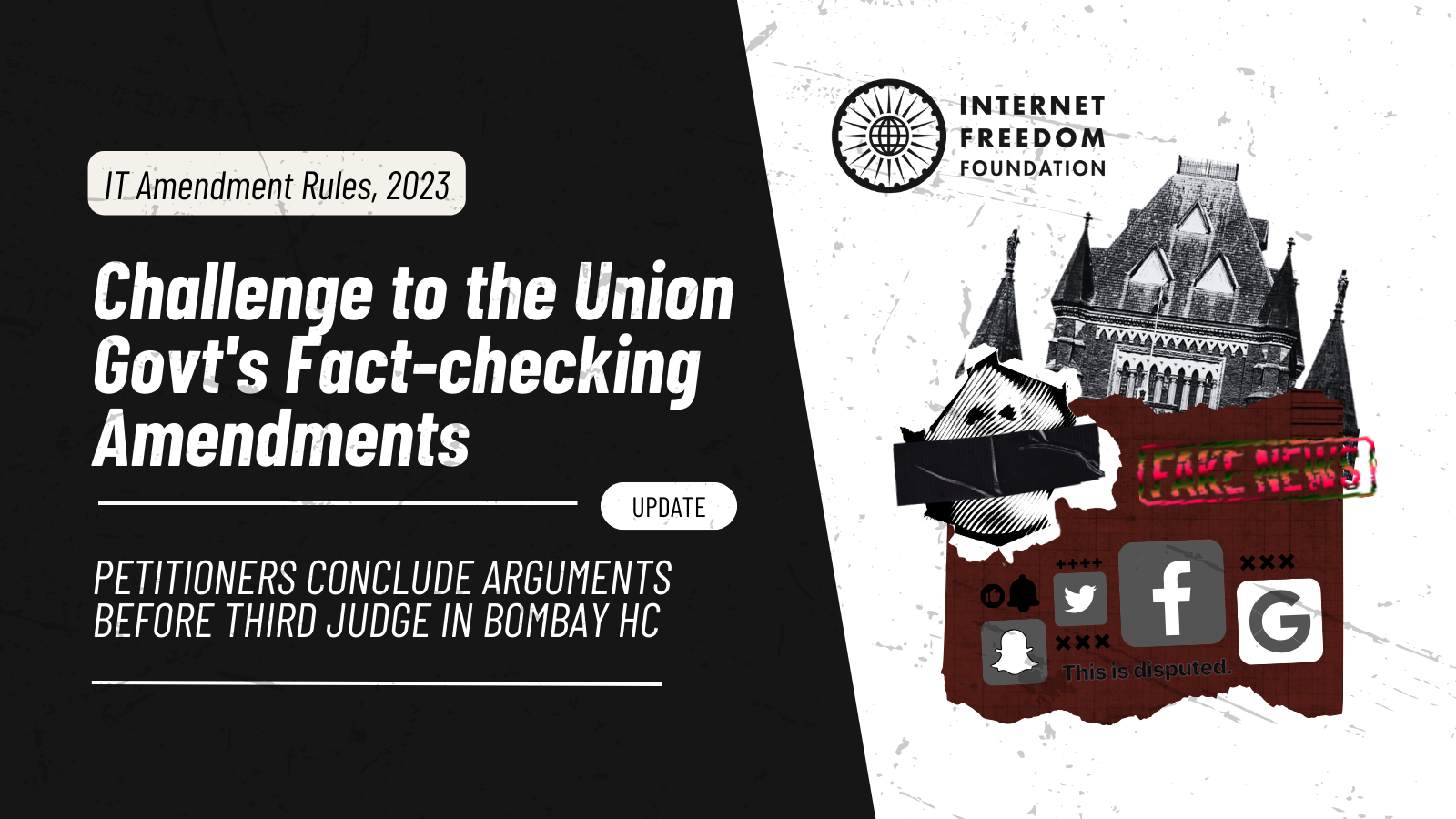
Tl;dr
After a marathon hearing before the Bombay High Court spanning over 7 days, starting from April 15 and ending on April 24, the Petitioners have concluded their arguments before the third Judge, Justice A.S. Chandurkar, in the petitions challenging the constitutionality of the Information Technology (Intermediary Guidelines and Digital Media Ethics Code) Amendment Rules, 2023 (“IT Amendment Rules, 2023”). This amendment allows a Fact-Check Unit formed by the Central Government to detect online content deemed "fake, false, or misleading" regarding matters pertaining to the government's business, and to seek its removal from the internet. IFF is providing legal assistance to the Association of Indian Magazines (AIM), one of the Petitioners in the matter.
Why should you care?
The Fact-Check Unit (FCU) established under the IT Amendment Rules, 2023, will be empowered to determine the accuracy of information online and decide whether it should remain accessible or be removed. The usage of the terms “fake, false or misleading” as well as “business of the Central Government” give the FCU immense leeway to decide what online content may be prohibited. This has the potential to take into its purview content that may be deemed to be critical of the government’s policies. If an intermediary fails to take down content flagged by the FCU, it may lose its safe harbour protection under Section 79 of the Information Technology Act, 2001 (“IT Act”). This poses a significant risk to the autonomy of the free press in the digital realm in India.
What has happened to date?
The Association of Indian Magazines, Kunal Kamra, and others filed writ petitions challenging the constitutionality of provisions relating to the FCU before the Bombay High Court. In April 2023, as a result of the petitions, the Union Government provided an undertaking not to constitute its FCU. The undertaking, having been accepted by the Division Bench of the Bombay HC, operated as an effective stay against the amendment.
On 31.01.2024, a split verdict was delivered and the matter was directed to be placed before the Hon’ble Chief Justice of the High Court of Bombay for reference to a third Judge. Due to further dissonance on the aspect of the undertaking being continued, the Division Bench directed the conclusive arguments on the issue of interim relief to be argued before the third Judge, i.e. Justice A.S. Chandurkar.
However, on 11.03.2024, the third Judge rejected the plea for interim relief and refused to stay the formation of the FCU during the pendency of the batch of petitions before the Bombay High Court. Accordingly, the Division Bench, passed the Order dated 13.03.2024 in favour of the majority view and rejected the interim relief sought by the Petitioner. This led the Union Government, in the absence of a stay, to notify the Press Information Bureau (PIB) as the FCU on March 20, 2024.
Challenging the denial of interim relief, the Petitioners approached the Supreme Court and sought the setting aside of the Orders of the Bombay High Court. The matter was taken up by a Bench headed by Chief Justice of India DY Chandrachud and comprising Justices J.B. Pardiwala and Manoj Misra. The Supreme Court, without making any observations on the merits of the constitutional challenge pending before the Bombay High Court, stayed the notification of the Union Government operationalising the FCU under PIB. They expressed the view that there indeed was a prima facie case in favour of the Petitioner that warranted the staying of the notification till the Bombay High Court finally decides the batch of petitions challenging the validity of the 2023 Amendment to the IT Rules 2021.
Arguments before the third Judge
With a stay in the favour of the Petitioners, arguments before Justice A.S. Chandurkar commenced on April 15, 2024, on the constitutionality of Rule 3(1)(b)(v) as amended by the IT Amendment Rules, 2023.
Sr. Adv. Navroz Seervai appeared on behalf of Kunal Kamra, and argued on how freedom of speech as protected under Article 19(1)(a) of the Constitution of India, was an inalienable right and allowed for the flourishing of a democracy. He further submitted that the IT Amendment Rules, 2023, were vague in their wording, violated the principles of natural justice, and could not be sustained in the face of Article 14 of the Constitution on account of it being ex facie manifestly arbitrary. Seervai concluded his arguments by taking the Court through the opinions of both Justice Gautam S. Patel (who struck down the amendment) and Justice Neela Gokhale (who upheld the amendment) to showcase how the latter had upheld the constitutionality by reading into the provision. '
Thereafter, Adv. Shadan Farasat argued on behalf of the Editors Guild of India and demonstrated how the IT Amendment Rules, 2023, infringed the right to practice one’s profession under Article 19(1)(g). He explained how press freedom would be directly impacted by the design of the amendment and that there was no rationality behind conceptualising an FCU when existing laws tackled fake news already.
Adv. Gautam Bhatia, appearing for the Association of Indian Magazines, made submissions on why the IT Amendment Rules, 2023, were ultra vires the Constitution of India as well as the IT Act. He further argued that the loss of safe harbour protection as envisaged under the IT Rules and the IT Act on account of non-compliance with Rule 3 of the IT Rules incentivised intermediaries to not toe the line and duly follow the diktats of the FCU.
Sr. Adv. Arvind Datar, appearing on behalf of the Intervenor, News Broadcasters and Digital Association, concluded the marathon hearing on the note that there already existed a mechanism that dealt with the proliferation of fake news and that there was no need for a new authority to be formed when there were provisions to deal with the same. He further noted that the government had failed to provide any reasoning on why an FCU would be needed in the first place.
Now that the arguments on the part of the Petitioners stand concluded, we eagerly await the arguments that are to be advanced by the Respondent, i.e. Union of India. They are slated to begin on June 11, 2024, and we shall keep you updated!As always, we are grateful to the Association for Indian Magazines for their support and confidence in us for taking up this important matter that goes to the root of online free speech for all Indians.
We are also grateful to Advocate Gautam Bhatia who led the arguments for AIM, and to the IFF Legal Team of Advocates Vrinda Bhandari, Abhinav Sekhri, Radhika Roy and Gayatri Malhotra. We are also grateful to Senior Advocates Darius Khambata and Navroz Seervai for their leadership and guidance, and to Advocates Arti Raghavan and Meenaz Kakalia.
Important Documents:
1. Previous blog post titled, “Big Relief! Supreme Court Stays Notification Constituting Fact-Check Unit!” (link)

